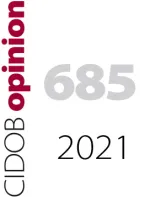The Digital Services Act and Tourist Rentals: A Challenge or an Opportunity for Cities?

The European Union is presently considering the proposal for a new digital services law (Digital Services Act, DSA), which was presented last December by the Von der Leyen Commission. Meanwhile, several European cities are assessing whether this future regulation will have a positive or negative effect on their ability to regulate and/or control tourism.
Before the onset of the pandemic, some European cities were faced with tourist overcrowding, partly boosted by the presence of intermediary platforms, but their capacities and means for dealing with it were limited. Nevertheless, during the COVID-19 crisis, tourism has dropped to almost forgotten and economically undesirable levels. There are great hopes for a revival of tourism in the post-pandemic period although it is recognised that this should not happen without addressing the problems associated with previous overcrowding.
Lina Khan has recently been appointed as president of the Federal Trade Commission in the United States and Margrethe Vestager is now in her second term as European Commissioner for Competition. Both women have been described as a scourge for technology companies and are clearly heading a new regulatory approach of market power in the digital world. There seems to be consensus on both sides of the Atlantic with regard to the need to curb the power of big digital companies but with little agreement on how to go about it. The new approach must consider other remedies, among them breaking up Big Tech or regulating the companies.
In Europe, the main hope seems to have taken the form of two legal initiatives presented by the European Commission last December: the Digital Markets Act (DMA) and the Digital Services Act (DSA), the former focused on the market power of big platforms and stipulating obligations of conduct, and the latter aimed at minimally controlling provision of digital services. These proposals must now be approved by the European Parliament and the EU Council of Ministers. The DSA is the law that could affect capabilities of regulation and control of tourist activity from the local perspective.
Following in the footsteps of its predecessor, the E-Commerce Directive, the DSA aims to uphold a number of axioms of the European approach to the digital environment: (i) the principle of country of origin which, in general, allows platforms to abide only by the laws of the member states in which they are established and not those of the member states where they operate; (ii) absence of any obligation to monitor activity carried out by the platform; (iii) and, as a logical consequence of this, exemption from responsibility for third-party activities and services provided through the platform.
Such rules of play have undoubtedly enabled the expansion, growth, and accessibility of cross-border digital services in Europe. These include tourist services and have benefitted citizens as a whole, yet some loopholes are also evident. The system permits or produces a certain lack of regulatory control since it makes it difficult to identify possible infringers of administrative rules, for example urban planning or tourism regulations for which regional and local authorities are responsible. Any administrative regime that lacks mechanisms to guarantee compliance also lacks credibility and is therefore fertile ground for potential and exponential infractions. Added to this, as several European cities have pointed out, is the impossibility of managing the total volume of tourist activity in the digital domain when it is essential to be able to do so in order to protect general interests like preservation of public space, neighbourhood coexistence, and guaranteeing a minimally balanced offer of housing and shops for residents.
The DSA seems to open up certain avenues that could contribute to improving this necessary regulatory effectiveness. On the one hand, there is a clear commitment to adopting mechanisms for scrutiny, traceability, and reporting of unlawful activities and services that might be provided online (for example, by means of mechanisms of notification and action, alerts from trusted watchdogs, transparency obligations, and so on). On the other hand, attempts are also being made to improve the accountability of very large platforms (that is, those with a monthly average of more than 45 million active users), among other means by requiring them to adopt mechanisms of risk identification and mitigation, to undergo audits, and to improve mechanisms of cross-border coordination and communication between regulatory authorities. However, a good number of the proposed mechanisms are not enforceable and neither have clear target dates been set for compliance. Furthermore, apart from the cases of the biggest platforms, the mechanisms for cross-border coordination still lack the means of enforcement when the online intermediary is found to be noncompliant, and the member state concerned refuses to take action.
In addition to all this, there is another major challenge, which is that the DSA has been envisaged as a horizontal instrument for regulating the provision of services in the digital sphere. This includes the online trade in goods and services, as well as social networks and other online communication platforms, which makes it difficult to enforce firm supervisory measures. Hence, for example, there is no clear legal basis envisaged at the European level for ordering the removal of illegal content although several European cities have been demanding this in relation with controlling tourist rentals. The attempt at regulation ends up confronting the dilemma that what might guarantee the security and lawfulness of e-commerce could be counterproductive in the domain of social networking and restrict freedoms therein. It is possible that the homogeneity sought by means of horizontality will end up being a one-fits-all approach that proves to be inefficient.
Keywords: cities, tourism, digital services, DSA, DMA, technological platforms, big tech, tourist rental, EU, e-commerce
D.L.: 2014-0843